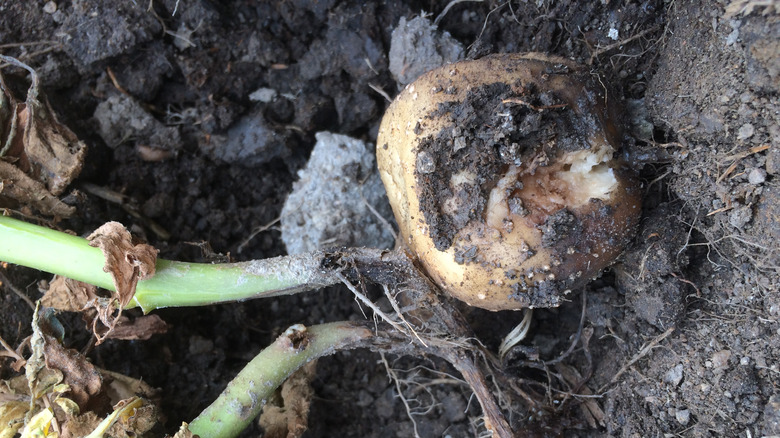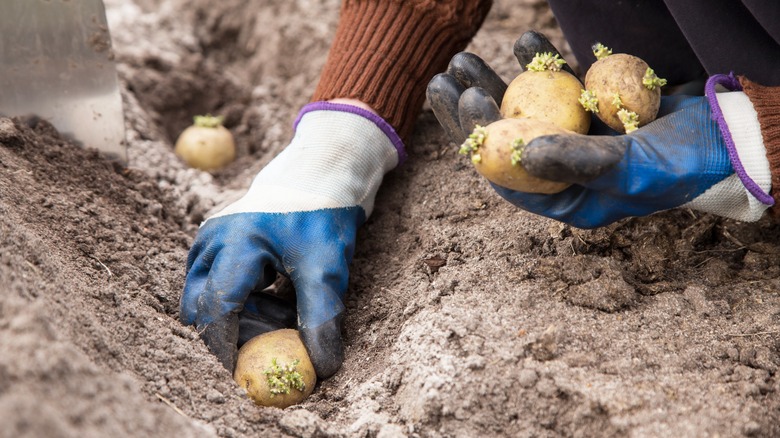Use This Secret Ingredient To Fight Mold On Potatoes Before Planting
We may receive a commission on purchases made from links.
Cutting seed potatoes into smaller pieces before planting them is a common practice that provides gardeners with more plants per potato. Although this technique is popular, there are a few drawbacks that may be concerning to those beginning their potato-planting journey. When seed potatoes are cut, they are more susceptible to disease and mold growth. This is because the inside surface of the potato is moist, which is the perfect environment for mold to flourish. Luckily, an easy-to-make hydrogen peroxide spray can kill mold even after it has grown on the cut potatoes' surface.
YouTube personality Gary Pilarchik of The Rusted Garden shared a video tutorial on using this spray to treat your moldy potato halves. To make this spray, all you will need is 3% hydrogen peroxide, water, and a spray bottle. Spray the potato in the areas where you notice mold growth. Apply enough to drench the mold. You will notice the hydrogen peroxide solution begins to fizz after it comes into contact with the mold. "It's going to kill off all the mold and all the fungus," Pilarchik explains. Clean off the residue and allow your potatoes to dry, and they should be restored.
Protect your potatoes by following these tips
In the YouTube video shared by Gary Pilarchik of The Rusted Garden, you will notice that it is recommended to mix your 3% hydrogen peroxide with water if you are concerned about the solution being too strong. You may use a mixture made up of half hydrogen peroxide and half water instead. The 3% hydrogen peroxide solution can be found and most drug stores and supermarkets. If you prefer to shop online, you can also pick it up on Amazon for about $7. Amazon is also a great place to snag an extra spray bottle if you do not already have one.
Once you have gathered all of your materials, it should be pretty simple to assemble your solution to spray onto your potatoes. "That will give your potatoes a better chance of surviving once they get into the ground," Pilarchik says.
You may be wondering whether it is possible to prevent mold from growing on your potatoes after you cut them in the first place. Fear not, there are a few precautions you can take to minimize the need to spray your potatoes down with this solution. First, do not store your cut potatoes for long periods before planting them. Cut them only about a day or two before planting them to minimize the likelihood of mold growth. You may also choose to apply powdered sulfur to protect them.
The science behind the hydrogen peroxide solution
You might be curious about the effectiveness of the hydrogen peroxide solution to combat mold on seed potatoes, as demonstrated by Gary Pilarchik of The Rusted Garden in his video. It turns out that there is a bit of scientific evidence that supports the idea that hydrogen peroxide helps solve the problem of mold growth on potatoes. A study published in the Journal of Plant Sciences (via Science Alert) concluded that the widely used hydrogen peroxide trick aided in protecting a sample of planted potatoes. This may have been due in part to the antimicrobial effect hydrogen peroxide has on plants, according to the study.
A separate study published by Crop Protection (via Science Direct) concluded that hydrogen peroxide could even be used to decrease silver scurf disease among a potato sample in storage. This disease is caused by fungus and creates leathery lesions across a potato. "The potato damage is expressed in two ways: First, [the] quality of the tubers is decreased. Second, increased weight loss and shrinkage of the potatoes follows evaporation of water through the damaged skin," according to the study. Using a hydrogen peroxide treatment "controlled the growth of the fungus on the skin of infected harvested tubers," researchers found. It should be noted that the potatoes used in this study were stored in a room that was fogged with a hydrogen peroxide solution rather than sprayed directly.

